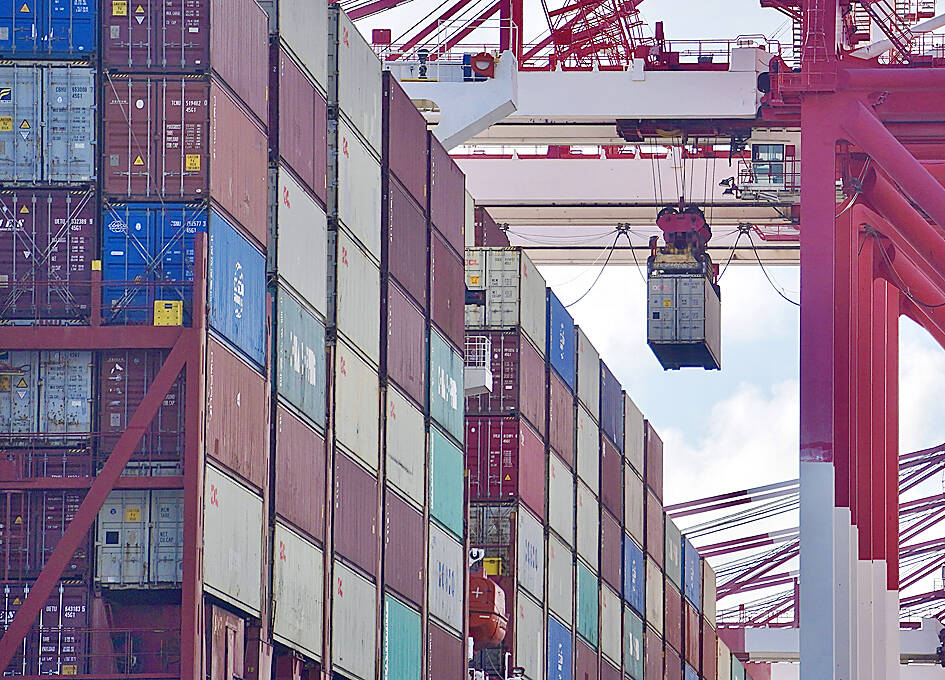Taiwan’s exports last month rose 16.8 percent from a year earlier to a record high US$43.64 billion, as demand for artificial intelligence (AI) products and services remained strong, while non-technology products started to show improvement, the Ministry of Finance said yesterday.
The volume was higher than expected due to shipment delays linked to Typhoon Gaemi in late July, Department of Statistics Director-General Beatrice Tsai (蔡美娜) said.
“The momentum would sustain this month with an expected year-on-year increase of 5 to 9 percent as global technology brands are to launch new-generation gadgets, while AI development continues to gain speed,” Tsai said.

Photo: CNA
Shipments of information and communications technology products soared 71.3 percent to a record high US$12.99 billion, on the back of heavy demand for AI servers, graphic cards and other devices, the ministry’s latest report showed.
However, exports of semiconductors weakened 0.5 percent to US$14 billion, as reshoring activity in the past few years to accommodate global electronics supply chain realignments skewed the comparison, Tsai said.
At the same time, almost all non-tech product categories posted sales uptrends, with 3.8 percent for plastic products and 12.2 percent for textile products, the ministry said.
“The data lent support to a more balanced recovery, although wobbly,” Tsai said.
Imports advanced 11.8 percent year-on-year to US$32.14 billion, giving the nation a trade surplus of US$11.49 billion in the month, suggesting a 33.6 percent increase from a year earlier, the ministry said.
Local firms actively bought semiconductor equipment from abroad to expand capacity and upgrade technology processes, as business visibility turned more lucid, Tsai said, adding that imports of semiconductor equipment last month soared 45.3 percent from a year earlier.
Firms were also more willing to build up input materials for exports later as evidenced by an 11.9 percent rise in imports of agricultural and industrial raw materials, she said.
In the first eight months of this year, exports rose 10.9 percent to US$308.57 billion, while imports increased 9.3 percent to US$256.12 billion, the ministry said.
The figures indicated room of upward revisions for GDP growth this quarter, when exports are set to beat the government’s earlier forecast by 2 to 3 percentage points, Tsai said.
China and Hong Kong remained the largest buyers of Taiwan’s goods last month, when shipments rose 1 percent from a year earlier to US$13.11 billion.
The US followed after purchasing US$11.89 billion worth of Taiwan’s goods, a new high, up 78.5 percent from a year earlier.
Exports to the ASEAN members totaled US$7.25 billion last month, up 5.6 percent from a year earlier, while exports to Europe rose 2.6 percent to US$3.70 billion. Bucking the upturn, exports to Japan fell 17.5 percent to US$2.07 billion due to a decline in electronics shipments.
Exports this month are expected to range between US$40.7 billion and NT$42.3 billion, up 5 to 9 percent from a year earlier, with the moderating growth largely reflecting a relatively high comparison base a year earlier, Tsai said.
Additional reporting by CNA

The Eurovision Song Contest has seen a surge in punter interest at the bookmakers, becoming a major betting event, experts said ahead of last night’s giant glamfest in Basel. “Eurovision has quietly become one of the biggest betting events of the year,” said Tomi Huttunen, senior manager of the Online Computer Finland (OCS) betting and casino platform. Betting sites have long been used to gauge which way voters might be leaning ahead of the world’s biggest televised live music event. However, bookmakers highlight a huge increase in engagement in recent years — and this year in particular. “We’ve already passed 2023’s total activity and

Nvidia Corp CEO Jensen Huang (黃仁勳) today announced that his company has selected "Beitou Shilin" in Taipei for its new Taiwan office, called Nvidia Constellation, putting an end to months of speculation. Industry sources have said that the tech giant has been eyeing the Beitou Shilin Science Park as the site of its new overseas headquarters, and speculated that the new headquarters would be built on two plots of land designated as "T17" and "T18," which span 3.89 hectares in the park. "I think it's time for us to reveal one of the largest products we've ever built," Huang said near the

China yesterday announced anti-dumping duties as high as 74.9 percent on imports of polyoxymethylene (POM) copolymers, a type of engineering plastic, from Taiwan, the US, the EU and Japan. The Chinese Ministry of Commerce’s findings conclude a probe launched in May last year, shortly after the US sharply increased tariffs on Chinese electric vehicles, computer chips and other imports. POM copolymers can partially replace metals such as copper and zinc, and have various applications, including in auto parts, electronics and medical equipment, the Chinese ministry has said. In January, it said initial investigations had determined that dumping was taking place, and implemented preliminary

Intel Corp yesterday reinforced its determination to strengthen its partnerships with Taiwan’s ecosystem partners including original-electronic-manufacturing (OEM) companies such as Hon Hai Precision Industry Co (鴻海精密) and chipmaker United Microelectronics Corp (UMC, 聯電). “Tonight marks a new beginning. We renew our new partnership with Taiwan ecosystem,” Intel new chief executive officer Tan Lip-bu (陳立武) said at a dinner with representatives from the company’s local partners, celebrating the 40th anniversary of the US chip giant’s presence in Taiwan. Tan took the reins at Intel six weeks ago aiming to reform the chipmaker and revive its past glory. This is the first time Tan